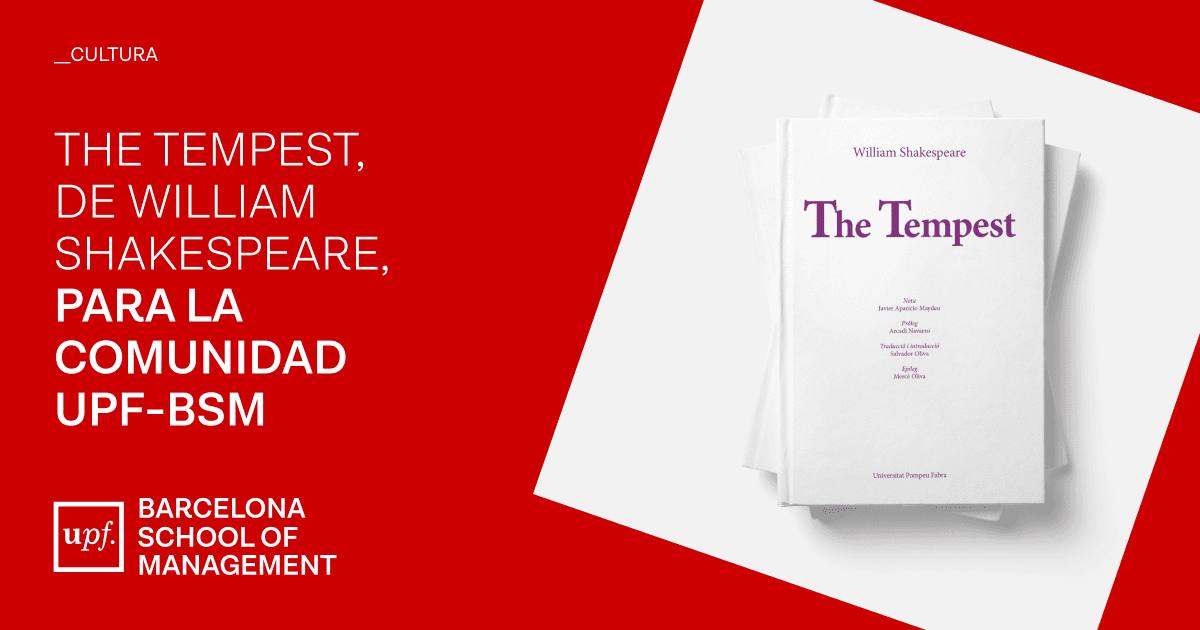
- About UPF-BSM
- Programs
- Faculty and research
- Companies and Organizations
- News & Events
“Shakespeare was real, but 90% of what his biographies tell is fictional”
21 Abril - 2021"Let's start with a clarification: Shakespeare existed, he was real". It is with this forcefulness that the publisher and translator Andreu Jaume has dispelled all kinds of doubts about the rumors surrounding the life and work of the most important author of all time.
This was certified during the webinar "And Shakespeare invented humans", organized by the Culture Program of the UPF Barcelona School of Management as part of the activities of Sant Jordi and in collaboration with the Institut d'Humanitats. "There are many biographies about Shakespeare, but most of them are based 10% on facts and 90% on made-up stories", regretted Jaume, who recommended the text by Bill Bryson. "Everything you can know about Shakespeare was written by him", he said.
"One of the biggest grievances Shakespeare has suffered is that his existence and his work has been doubted", insisted Jaume, who led a session through Shakespeare's Elizabethan England and the intricacies of his personal life that undoubtedly affected his creations.
From humor to "dark comedy"
"Shakespeare had to be a very funny guy: even in the darkest tragedies there is always a touch of humor", noted the critic and publisher, responsible for the edition of Shakespeare's complete works in Spanish and the translation into Spanish of King Lear (Penguin Clásicos, 2016).
Although Shakespeare "always had an innate comic intuition", he found it difficult to adapt to the drama that prevailed during the reign of Elizabeth I and that his contemporary, colleague and competitor, Christopher Marlowe, mastered so well.
"His life, Marlowe's, was passionate, having to deal endlessly with the rejection of homosexuality; Shakespeare's, on the other hand, was more ordinary". The famous playwright married Anne Hathaway, with whom he had three children: Susanna, Judith and Hamlet. It was precisely the death of the only boy, Hamnet, when he was only eleven years old, that transformed his work.

Gradually, Shakespeare took up tragic dialogue in his plays through historical dramas. In the 16th century, "England was a nation that was creating its mythology for the first time, and there Shakespeare inserted himself in a masterful way", said Jaume. A path that led him to write his great tragedy: Hamlet.
"The playwright's tone darkens from the age of 40 onwards", said the publisher, who added: "He had lost a son, he felt the bite of the passing of time and that is very noticeable". From that moment on, Shakespeare stopped writing comedies or wrote what are known as "dark comedies".
After the glory, farewell
Finally, Shakespeare conquered the tragic dialectic he so craved and had so envied in Marlowe, who died under strange circumstances after being accused of being a government spy.
"King Lear is the best play of Shakespeare and of the entire Elizabethan period", said Jaume. However, after the death of Elizabeth I, the last monarch of Tudor dynasty, Shakespeare no longer wrote either tragedies or comedies.
His last solo work, The Tempest, will act as his farewell. "In it he incorporates all the elements researched during his dramaturgy, turning them into a myth", said the critic and publisher, who pointed out that the play works as a "reconciliation". To exemplify this, Jaume quoted one of the most famous phrase of the work: "We are such stuff as dreams are made on and our little life is rounded with a sleep".
Whatever the case may be, Shakespeare was real and his work still enlightens us in an era, ours, of "overdimensioned ego apotheosis in which everything is biography and publicity", said the editor, who concluded: "Well thought out, not knowing much about Shakespeare is a relief".